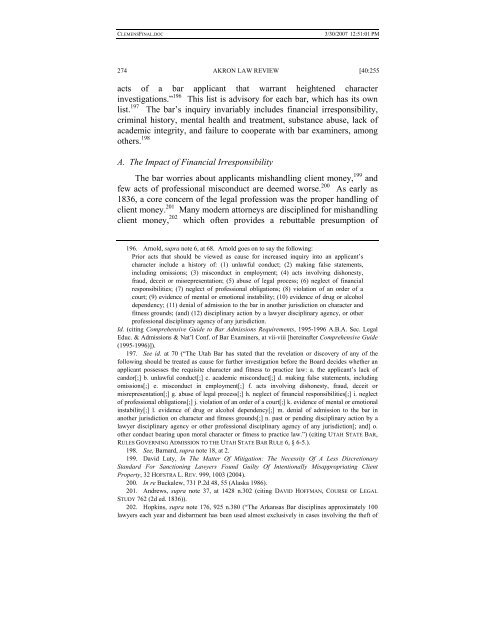Facing the Klieg Lights: Understanding the "Good Moral Character"
Facing the Klieg Lights: Understanding the "Good Moral Character"
Facing the Klieg Lights: Understanding the "Good Moral Character"
Create successful ePaper yourself
Turn your PDF publications into a flip-book with our unique Google optimized e-Paper software.
CLEMENSFINAL.DOC<br />
3/30/2007 12:51:01 PM<br />
274 AKRON LAW REVIEW [40:255<br />
acts of a bar applicant that warrant heightened character<br />
investigations.” 196 This list is advisory for each bar, which has its own<br />
list. 197 The bar’s inquiry invariably includes financial irresponsibility,<br />
criminal history, mental health and treatment, substance abuse, lack of<br />
academic integrity, and failure to cooperate with bar examiners, among<br />
o<strong>the</strong>rs. 198<br />
A. The Impact of Financial Irresponsibility<br />
The bar worries about applicants mishandling client money, 199 and<br />
few acts of professional misconduct are deemed worse. 200 As early as<br />
1836, a core concern of <strong>the</strong> legal profession was <strong>the</strong> proper handling of<br />
client money. 201 Many modern attorneys are disciplined for mishandling<br />
client money, 202 which often provides a rebuttable presumption of<br />
196. Arnold, supra note 6, at 68. Arnold goes on to say <strong>the</strong> following:<br />
Prior acts that should be viewed as cause for increased inquiry into an applicant’s<br />
character include a history of: (1) unlawful conduct; (2) making false statements,<br />
including omissions; (3) misconduct in employment; (4) acts involving dishonesty,<br />
fraud, deceit or misrepresentation; (5) abuse of legal process; (6) neglect of financial<br />
responsibilities; (7) neglect of professional obligations; (8) violation of an order of a<br />
court; (9) evidence of mental or emotional instability; (10) evidence of drug or alcohol<br />
dependency; (11) denial of admission to <strong>the</strong> bar in ano<strong>the</strong>r jurisdiction on character and<br />
fitness grounds; (and) (12) disciplinary action by a lawyer disciplinary agency, or o<strong>the</strong>r<br />
professional disciplinary agency of any jurisdiction.<br />
Id. (citing Comprehensive Guide to Bar Admissions Requirements, 1995-1996 A.B.A. Sec. Legal<br />
Educ. & Admissions & Nat’l Conf. of Bar Examiners, at vii-viii [hereinafter Comprehensive Guide<br />
(1995-1996)]).<br />
197. See id. at 70 (“The Utah Bar has stated that <strong>the</strong> revelation or discovery of any of <strong>the</strong><br />
following should be treated as cause for fur<strong>the</strong>r investigation before <strong>the</strong> Board decides whe<strong>the</strong>r an<br />
applicant possesses <strong>the</strong> requisite character and fitness to practice law: a. <strong>the</strong> applicant’s lack of<br />
candor[;] b. unlawful conduct[;] c. academic misconduct[;] d. making false statements, including<br />
omissions[;] e. misconduct in employment[;] f. acts involving dishonesty, fraud, deceit or<br />
misrepresentation[;] g. abuse of legal process[;] h. neglect of financial responsibilities[;] i. neglect<br />
of professional obligations[;] j. violation of an order of a court[;] k. evidence of mental or emotional<br />
instability[;] l. evidence of drug or alcohol dependency[;] m. denial of admission to <strong>the</strong> bar in<br />
ano<strong>the</strong>r jurisdiction on character and fitness grounds[;] n. past or pending disciplinary action by a<br />
lawyer disciplinary agency or o<strong>the</strong>r professional disciplinary agency of any jurisdiction[; and] o.<br />
o<strong>the</strong>r conduct bearing upon moral character or fitness to practice law.”) (citing UTAH STATE BAR,<br />
RULES GOVERNING ADMISSION TO THE UTAH STATE BAR RULE 6, § 6-5.).<br />
198. See, Barnard, supra note 18, at 2.<br />
199. David Luty, In The Matter Of Mitigation: The Necessity Of A Less Discretionary<br />
Standard For Sanctioning Lawyers Found Guilty Of Intentionally Misappropriating Client<br />
Property, 32 HOFSTRA L. REV. 999, 1003 (2004).<br />
200. In re Buckalew, 731 P.2d 48, 55 (Alaska 1986).<br />
201. Andrews, supra note 37, at 1428 n.302 (citing DAVID HOFFMAN, COURSE OF LEGAL<br />
STUDY 762 (2d ed. 1836)).<br />
202. Hopkins, supra note 176, 925 n.380 (“The Arkansas Bar disciplines approximately 100<br />
lawyers each year and disbarment has been used almost exclusively in cases involving <strong>the</strong> <strong>the</strong>ft of
















